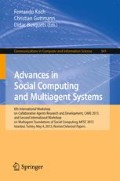Abstract
While collaborative learning has long been believed to hold a great value for organizations and classrooms, Modeling this learning in small, short-term project teams is a challenge. This paper describes the development of an agent-based modeling approach that can assist in understanding the collaborative learning of such project teams. A key aspect of the presented approach is our distinction between knowledge and skills required for the achievement of project goals. Both of these forms of intelligence need to be learned in the project context, but the rate of their expansion or enhancement may proceed differently, depending on the personality makeup of the team and the mechanism employed for team assembly. Based on reports from the theoretical and empirical literature, we derive a multi-agent computational model that characterizes how knowledge and skills may be learned among team members with varying personality attributes. Also, Group formation in virtual learning environments is either done voluntary or with the support from the system. In this connection, we studied two types of group formation mechanisms and the role of each mechanism in the collaborative learning and performance of teams.
Access this chapter
Tax calculation will be finalised at checkout
Purchases are for personal use only
References
Chen, L., Yang, Q.: A group division method based on collaborative learning elements. In: The 26th Chinese Control and Decision Conference (2014 CCDC), pp. 1701–1705 (2014)
Spoelstra, M., Sklar, E.: Using simulation to model and understand group learning. In: Proceedings of AAMAS, vol. 7 (2007)
Khandaker, N., Soh, L.-K.: ClassroomWiki: a wiki for the classroom with multiagent tracking, modeling, and group formation. In: Proceedings of the 9th International Conference on Autonomous Agents and Multiagent Systems: volume 1-Volume 1. International Foundation for Autonomous Agents and Multiagent Systems (2010)
Khandaker, N., Soh, L.-K.: SimCoL: a simulation tool for computer-supported collaborative learning. IEEE Trans. Syst. Man Cybern. Part C Appl. Rev. 41(4), 533–543 (2011)
Anderson, J.R., Bothell, D., Byrne, M.D., Douglass, S., Lebiere, C., Qin, Y.: An integrated theory of the mind. Psychol. Rev. 111(4), 1036–1060 (2004)
Laird, J.: SOAR: an architecture for general intelligence. Artif. Intell. 33(1), 1–64 (1987)
Kieras, D.E., Meyer, D.E.: An overview of the EPIC architecture for cognition and performance with application to human-computer interaction. Hum. Comput. Interact. 12(4), 391–438 (1997)
Martínez-Miranda, J., Pavón, J.: Modelling trust into an agent-based simulation tool to support the formation and configuration of work teams. In: Demazeau, Y., Pavón, J., Corchado, J.M., Bajo, J. (eds.) 7th International Conference on Practical Applications of Agents and Multi-Agent Systems (PAAMS 2009). AISC, vol. 55, pp. 80–89. Springer, Heidelberg (2009)
Costa, R.R.M., Paul T.: Professional manual: revised NEO personality inventory (NEO-PI-R) and NEO five-factor inventory (NEO-FFI). In: Psychological Assessment Resources, Odessa, FL (1992)
Myers, I.: The Myers-Briggs Type Indicator. Consulting Psychologists Press, Palo Alto (1962)
Jung, C.G.: Psychological Types: Or the Psychology of Individuation. Harcourt, Brace, New York (1921)
Varvel, T., Adams, S.G., Pridie, S.J., Ruiz Ulloa, B.C.: Team effectiveness and individual Myers-Briggs personality dimensions. J. Manage. Eng. 20(4), 141–146 (2004)
Myers, I.B., Most, R., McCaulley, M.H.: Manual: A Guide to the Development and Use of the Myers-Briggs Type Indicator. Consulting Psychologists Press, Palo Alto (1985)
Capretz, L.F.: Personality types in software engineering. Int. J. Hum Comput Stud. 58(2), 207–214 (2003)
Bradley, J.H., Hebert, F.J.: The effect of personality type on team performance. J. Manage. Dev. 16(5), 337–353 (1997)
Cruz, S., da Silva, F.Q.B., Capretz, L.F.: Forty years of research on personality in software engineering: a mapping study. Comput. Human Behav. 46, 94–113 (2015)
Dignum, V., Van Eijk, R.: Towards a model to understand the influence of trust in knowledge sharing decisions. In: Workshop on Trust AAMAS (2005)
Castelfranchi, C.: Trust mediation in knowledge management and sharing. In: Jensen, C., Poslad, S., Dimitrakos, T. (eds.) iTrust 2004. LNCS, vol. 2995, pp. 304–318. Springer, Heidelberg (2004)
Fernlund, H.K.G.: Evolving models from observed human performance. Dissertation, University of Central Florida Orlando, Florida (2004)
Anderson, J.R.: Learning and Memory: An Integrated Approach. Wiley, New York (2000)
Kim, J.W., Ritter, F.E., Koubek, R.J.: An integrated theory for improved skill acquisition and retention in the three stages of learning. Theor. Issues Ergon. Sci. 14(1), 22–37 (2013)
University of Chicago and Argonne National Laboratory: RECURSIVE Porous Agent Simulation Toolbox (2007)
Author information
Authors and Affiliations
Corresponding author
Editor information
Editors and Affiliations
Rights and permissions
Copyright information
© 2015 Springer International Publishing Switzerland
About this paper
Cite this paper
Farhangian, M., Purvis, M., Purvis, M., Savarimuthu, T.B.R. (2015). The Effects of Temperament and Team Formation Mechanism on Collaborative Learning of Knowledge and Skill in Short-Term Projects. In: Koch, F., Guttmann, C., Busquets, D. (eds) Advances in Social Computing and Multiagent Systems. MFSC 2015. Communications in Computer and Information Science, vol 541. Springer, Cham. https://doi.org/10.1007/978-3-319-24804-2_4
Download citation
DOI: https://doi.org/10.1007/978-3-319-24804-2_4
Published:
Publisher Name: Springer, Cham
Print ISBN: 978-3-319-24803-5
Online ISBN: 978-3-319-24804-2
eBook Packages: Computer ScienceComputer Science (R0)

